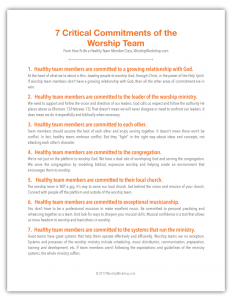I’ve lead and served on worship teams with some sketchy people. Not like creepers (OK, there might’ve been a few of those), but people who added a distinct angle of dysfunction to the team.
Now, don’t get me wrong—we all bring dysfunction to a team. And there some teams that have highly dysfunctional behavior happening. That’s it’s own blog post (or really, a coaching session). I want to focus on more typical dysfunctional behavior we find on our teams.
To do that, I’ve identified nine types of “sketchy” worship team behavior and gave them a face. The gender is irrelevant (I just alternated between men and women). Men and women are equal offenders for all of these. And you might even have some team members who are conglomerations of a few of these people.
The big problem is this: the sketchy behavior of the following nine people is tempting to ignore. But the presence of any of these issues will eventually cause more team-eroding dysfunction. So let’s meet these sketchy team members and see if any of them are a part of your ministry.
Gigging Gwen
Q: Have you seen Gwen lately?
A: Not since the last Sunday she was scheduled.
The last thing we want is to create a legalistic, “never miss church” culture. But healthy team members are invested in their local church beyond just their scheduled weekends. They don’t treat their worship team commitment like a gig.
Steve the Squatter
Squatting is a term for occupying a place without paying rent and without permission.
On a worship team, squatting looks like this: a musician or tech—let’s call him “Steve”—has achieved a position in the ministry for which he is no longer (or never was) qualified.
Steve the Squatter probably came onboard when standards were lower.
Since Steve’s abilities don’t match his responsibilities, he’s a liability. Unfortunately, worship team squatters like Steve, just like apartment squatters, can be tough to get rid of.
Steve’s had a position on the team for awhile, and he keeps showing up. Plus, he’s a likable enough guy.
Healthy teams have techs and musicians whose abilities match their responsibilities. If you have a squatter, it’s time for a crucial conversation that leads to either additional training and development, or a new ministry for which the squatter is better suited.
Rachel the Renter
Unlike squatters, “renters” have a right to be on the team—at least skill-wise. Rachel pulls her own weight. For her, the worship team is a transaction. She pays with her talent, time and energy. In exchange for the right notes and good attendance, she has “her” ministry.
And here’s the thing: Rachel is happy using her talents and skills for the Lord. As long as things go her way.
Just like a renter of a house, Rachel the Renter has possession of her position without paying the true cost of ownership. And that creates an ugly thing called entitlement.
What does entitlement look like for Rachel? Well, since this is “her” ministry, she feels entitled:
- To be scheduled as much, if not more, than the others.
- To take the lead on every Meredith Andrews song.
- To pout when someone else gets it.
- To miss rehearsals occasionally because, “hello, I already know the music…”
- To have at least one spot on the special music rotation.
- To voice her opinion on all changes and decisions, and believes her voice carries a lot of weight with the team.
Unfortunately, sometimes it does.
Rachel is a renter. She has possession of her position without the true cost of ownership.
Unlike Rachel, healthy worship team members are stewards. A steward treats her ministry position like it’s her own, but she isn’t possessive of it. She knows she’ll give it back someday and wants to return it better than she found it. (Matthew 25)
Venting Vaughn
When Vaughn gets frustrated with people or situations on the worship team, you hear about it. But he’s not complaining or gossiping. No, Vaughn doesn’t do that. Vaughn is simply “venting.”
Here’s the problem with venting: Unless you’re “venting” to the person who can change things—a leader, the offending person, etc.—it is just complaining. Or worse, gossip.
And let’s be real: Vaughn isn’t usually interested finding a solution or reconciliation. It’s about him getting others to agree with him, so he feels validated.
Unlike Vaughn, healthy team members know how to confront issues directly (and gracefully) with their leaders and other team members. They don’t stir up dissension and discord by complaining to people who can’t fix it. They seek to restore, reconcile and repair.
Tardy Tasha
Every team member has “one of those weeks” where they show up late. Tasha has those weeks every week.
We can have grace for someone who is infrequently late due to unforeseen circumstances. But when it’s a definite pattern of delayed arrival, it’s time to add a dose of hard truth to the grace.
Consistent lateness is usually a sign of a more significant issue—like commitment to the team, problems with leadership/authority, or just a general lack of self-discipline. Regardless, a leader needs to confront Tasha about this.
Also, NEVER wait for her to arrive before you start rehearsal. That sends a clear message of condoning.
Healthy team members show up BEFORE the posted start time for rehearsals and soundchecks so they can be ready to go. It shows respect for the leaders, other team members, and themselves.
Unprepared Parker
Every rehearsal, you usually hear Parker ask one or more of these questions…
- Do you have the charts for this song?
- What key is this tune in?
- Can we run that again?
- Was I supposed to learn that solo?
- Is this a new song?
- Where are we? I got lost after the bridge.
Parker routinely shows up unprepared. He’s a decent musician, and that’s part of the problem. He thinks he can just wing it.
Healthy team members understand this: Practice is personal; rehearsal is relational. They practice their part at home and come to rehearsal prepared to polish and perfect the song, not learn it.
Envious Ellie
Ellie is a great background vocalist. Her harmonies are solid, and her pitch is spot-on. But when her worship leader delegates the lead for the female-driven, powerhouse anthems, she never gets tapped.
Deep down, Ellie knows she doesn’t have the pipes for the big songs. But she takes it personally. So personally, in fact, that she often feels like her position is in jeopardy every time a new vocalist joins the team.
Envy (wanting something you don’t have) and jealousy (the fear of losing something you already have) are all too familiar inside a music ministry. It’s because people find worth through their performance and belonging to the team.
Healthy team members work to find their identity as God’s dearly loved children. It’s not always easy. But they talk about their feelings of envy, jealousy, and discontentment with trusted friends or leaders as a first step of moving past them.
Onstage Owen
Owen’s a fantastic musician and expressive worshiper. But he feels (and even occasionally vocalizes) that he “just worships better onstage.” When asked about it by his leader, he replied, “It just doesn’t feel the same when I’m out with the audience.”
Owen’s right about one thing. Worshiping on the platform is different. The lights, the mics, the instruments, the synergy of the band—it offers an experience that can’t be duplicated in the pews.
His leader didn’t ask, but she’s guessing (rightly) that Owen’s personal worship times are non-existent.
Healthy worship team members understand three critical truths about worshiping on versus off the platform:
1. Worship is a choice.
When we’re not on the platform, we can still choose worship with our utmost. Will it feel the same? Probably not. But that’s OK.
Worship is not about me and how I feel. It’s about God’s glory and responding to His love for me.
2. The congregation is our church family—NOT an audience.
When each of our churches gather for worship, we’re a unique, local expression of the body of Christ—a family within THE Family. And we invite our family to worship with us, not watch us.
3. Our platform worship will never exceed our private worship.
We can look and sound worshipful on the stage. But if we aren’t worshiping God privately throughout the week, our worship is a whitewashed tomb.
Always Available Allie
Every leader wants an Allie on their team. She’s dependable. She’s prepared. She’s easy to get along with. And she’s always quick to volunteer to fill an open spot.
The problem with Allie is that she never takes a break. She’s not like Owen and “needs” the stage. She’s just a super-helpful person and hates letting anyone down. In fact, she just might be addicted to yes.
Allie is heading for the brick wall of burnout. She can’t see it yet, but soon, she won’t find the same joy of serving as she had before. In fact, Allie will dread the upcoming rehearsals and services but still won’t say no.
Eventually, she’ll feel like she’s being taken advantage of. And she’ll resent it.
Before long, the pain of her overcommitment will exceed the pain of letting others down. And she’ll do just that:
Call off.
Quit the team.
Or even leave the church.
Healthy team members create boundaries. They know they need rest and time away, even if it means letting others down. And healthy leaders are on the lookout for people like Always Available Allie to protect them and intervene before they flame out.
Three Steps/Three (Free) Tools
So there are nine sketchy people you might find on your worship team. And my guess is you can identify at least five of the nine in your ministry. Here’s the thing: don’t ignore their behavior, no matter how uncomfortable it is to deal with the situation.
And don’t write them off—you can lead most of them back to a healthy place.
But the big question is this—where do you start as a leader in dealing with ALL of these different angles of dysfunction?
Let me give you a series of steps to take (along with a free tool at each step):
 First Step: Learn The 7 Critical Commitments of the Worship Team
First Step: Learn The 7 Critical Commitments of the Worship Team
As I’ve worked with worship teams over the years, I came to see that there were seven areas where team members needed to be committed. Here’s a quick guide sheet that defines each of those seven commitments for you. The PDF is a free download and is easy to share with your leaders and team.
Second Step: Get Real and Grade Your Team
To start building a healthier your team, you need to “get real” about your team’s current reality. Go here to grade your team in these seven areas of commitment. This Healthy Worship Team Grade Tool is free with no sign-up required.
Third Step: Teach Your Team the 7 Critical Commitments
You can share the quick guide PDF with your team. But to really dig in and teach them, you’ll want to sign up for the free class, How to Be a Healthy Team Member.
It’s a ready-made training course for your team that teaches them these seven critical commitments, or “engagement areas” as we call them inside the training.
How To Be a Healthy Team Member includes eight, on-demand videos, handouts and a discussion guide. All free. Sign up here for immediate access.
Dealing with the “sketchy” people isn’t fun. But leading our congregation on Sunday means we MUST develop and grow healthy worship team members. These three tools will give you the foundation to start that journey towards a healthier and stronger team.
Stuck?
Learn how to level-up your team with this free video training.







